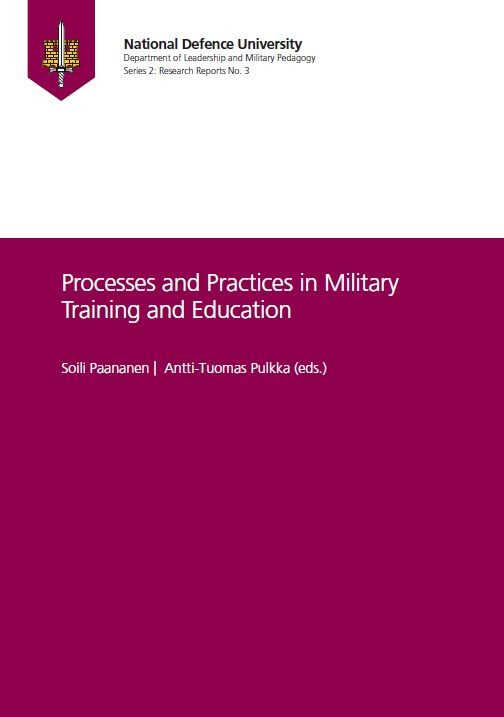Processes and Practices in Military Training and Education
Editori
Paananen, Soili
Pulkka, Antti-Tuomas
Johtamisen ja sotilaspedagogiikan laitos
Sotilaspedagogiikka
Maanpuolustuskorkeakoulu
2019
Julkinen
Julkaisun pysyvä osoite on
https://urn.fi/URN:ISBN:978-951-25-3108-0
https://urn.fi/URN:ISBN:978-951-25-3108-0
Tiivistelmä
National armed forces and international military institutions face volatile missions, diverse tasks, and ever-changing complex, multilevel operational environments. In this sense, change is the only constant. However, the instructional function of military organizations is also a constant. Individuals already in service adapt to and actively adapt their thinking and skills when sudden shifts in context and given tasks demand this; such is the nature of the military profession. However, both serving members and new recruits in all phases of their careers undergo organized military education and training.
The viewpoint chosen in this anthology is the examination of practices and processes in military education and training that have not received sufficient attention in the scientific military debate. In this respect, the focus is on everyday activities that produce significant professional knowledge for military students and personnel both intentionally and/or otherwise. These activities bring into focus habitual practices, and disturbances that open up new opportunities or actions that preserve, transfer, or prevent knowledge that might have been possible to acquire. These actions and the knowledge they produce are further understood as a resource that can be incorporated into professional learning. Four scholars, writing from different points of view, have contributed to this anthology, and we believe that their contributions provide a rich and interesting picture of the landscape of varying military educational challenges in the 21st century. All of the chapters were peer reviewed, two by the editors of this anthology, while two underwent a double-blind peer review process in which the reviewers were academics with specific expertise in the given field, holding at least adjunct professorship in social or military sciences.
The viewpoint chosen in this anthology is the examination of practices and processes in military education and training that have not received sufficient attention in the scientific military debate. In this respect, the focus is on everyday activities that produce significant professional knowledge for military students and personnel both intentionally and/or otherwise. These activities bring into focus habitual practices, and disturbances that open up new opportunities or actions that preserve, transfer, or prevent knowledge that might have been possible to acquire. These actions and the knowledge they produce are further understood as a resource that can be incorporated into professional learning. Four scholars, writing from different points of view, have contributed to this anthology, and we believe that their contributions provide a rich and interesting picture of the landscape of varying military educational challenges in the 21st century. All of the chapters were peer reviewed, two by the editors of this anthology, while two underwent a double-blind peer review process in which the reviewers were academics with specific expertise in the given field, holding at least adjunct professorship in social or military sciences.
Kokoelmat
- Julkaisut [500]
